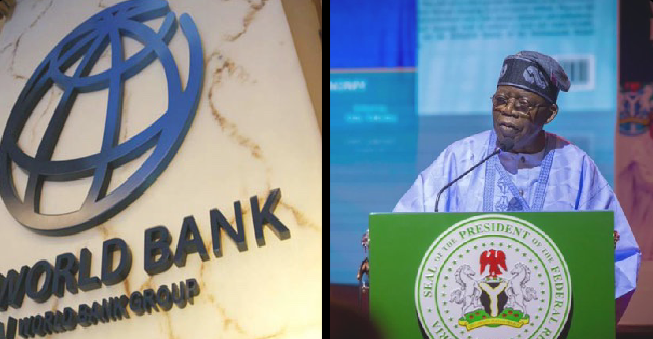
World Bank Approves $632 Million Loan to Nigeria Amid Rising Debt Concerns

The World Bank is set to approve fresh loans totaling $632 million to Nigeria today (Monday) despite growing concerns over the nation’s increasing debt burden. The loans are aimed at addressing critical sectors, including nutrition improvement and quality basic education, which have been facing significant challenges due to economic constraints and infrastructural deficiencies.
Nigeria, Africa’s largest economy, has been grappling with financial difficulties exacerbated by declining revenue, inflation, and exchange rate volatility. The new World Bank loan comes at a time when the country is seeking ways to stabilize its economy and support its citizens in the face of rising food insecurity and an education system struggling with inadequate funding.
The approval of these loans is expected to bring a much-needed financial injection into key sectors that directly impact millions of Nigerians. The nutrition-focused component of the loan is targeted at improving food security and reducing malnutrition, especially among children and vulnerable groups. With food prices soaring and access to nutritious meals becoming increasingly difficult for many families, the intervention is considered crucial in mitigating the adverse effects of hunger and poor diet.
On the other hand, the funding allocated to quality basic education aims to enhance learning infrastructure, provide essential teaching materials, and improve teacher training. Nigeria’s education sector has long been plagued by inadequate facilities, overcrowded classrooms, and a lack of qualified teachers. The additional funding is expected to bridge some of these gaps, ensuring that more children receive a better-quality education.
However, the decision to approve new loans has sparked concerns among economic analysts and financial experts. Nigeria’s public debt has been on an upward trajectory, with many warning about the potential long-term consequences of continued borrowing. The country’s debt stock has raised alarms over debt servicing obligations, which consume a significant portion of the national budget.
Critics argue that while the loans are intended for crucial sectors, the challenge lies in effective implementation and accountability. In the past, similar financial interventions have been marred by mismanagement, corruption, and inefficiency, raising questions about whether the new funds will be utilized as intended. The World Bank has previously emphasized the need for transparency and proper monitoring to ensure that the loans achieve their desired objectives.
Government officials have defended the loan request, stating that the funds are necessary to address urgent social and economic needs. They argue that the loans will serve as a temporary relief while the country works on long-term solutions to revenue generation and economic diversification. The government has also assured stakeholders that it will put in place strict measures to ensure proper utilization and accountability of the funds.
Despite these assurances, the announcement has drawn mixed reactions from the public. Many Nigerians remain skeptical about the impact of foreign loans on the country’s development, citing previous cases where borrowed funds failed to translate into tangible improvements. Some believe that instead of relying on loans, the government should focus on cutting wasteful spending, improving tax collection, and encouraging investments in key industries.
Economists have weighed in on the situation, warning that excessive borrowing without a clear repayment strategy could push Nigeria further into financial distress. According to experts, the government must prioritize economic policies that enhance productivity and revenue generation rather than depending solely on external loans. They emphasize the importance of investing in sectors such as agriculture, manufacturing, and technology to create sustainable economic growth.
The approval of the $632 million loan also comes amid ongoing discussions about Nigeria’s broader economic policies and financial management. The International Monetary Fund (IMF) and other global financial institutions have previously urged the Nigerian government to adopt more prudent fiscal policies, reduce dependency on borrowing, and implement structural reforms that can drive long-term economic stability.
For ordinary Nigerians, the primary concern remains how the loan will translate into real improvements in their daily lives. Many households are struggling with the rising cost of living, unemployment, and declining purchasing power. With inflation reaching record levels, the cost of basic necessities has skyrocketed, making it difficult for families to afford adequate nutrition and quality education for their children.
The government has reiterated its commitment to ensuring that the loan is directed toward impactful projects. Officials have pledged to work closely with the World Bank and other relevant stakeholders to guarantee transparency in fund allocation and project execution.
As Nigeria awaits the final approval and disbursement of the funds, all eyes will be on how the government implements these projects and whether they will bring meaningful change. The success of this loan program could determine the country’s future approach to financial assistance and development funding. If properly managed, the loan could provide the needed boost to critical sectors, helping to alleviate some of the pressing challenges faced by millions of Nigerians. However, if mismanaged, it could further deepen the country’s financial woes and fuel public distrust in government policies.
The World Bank’s decision to approve the loan signifies its continued support for Nigeria’s development efforts. However, it also highlights the urgent need for the country to adopt sustainable economic strategies that reduce dependency on external borrowing. Moving forward, policymakers must strike a balance between securing financial support and ensuring long-term economic viability.
The coming months will be crucial in determining the impact of this loan on Nigeria’s economy and the well-being of its citizens. With the stakes high and expectations even higher, the government faces immense pressure to deliver tangible results. Whether this loan will be a step toward economic recovery or another addition to Nigeria’s mounting debt burden remains to be seen.


